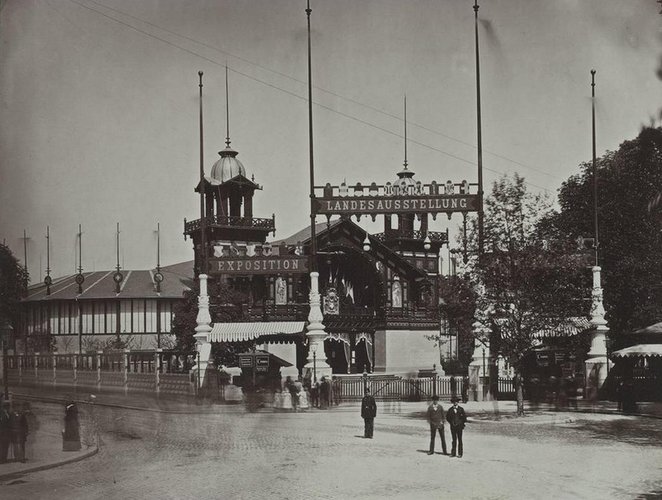The first national exhibition of Swiss industry, crafts and agriculture was held on the Platzspitz in Zurich at a time of rising nationalism. No less than 1.75 million tickets were sold.
The Confederation used the exhibition to draw public attention to the importance of schools. A year earlier, it had suffered a crushing defeat in the vote on the revision of the current law. The issues of school subsidies, scholarships and scientific research were only regulated by supplements to the Federal Constitution. In 1883, many rural areas were opposed to a positive presentation of compulsory schooling. The results of the examination taken by the recruit schools were finally published. Recruits from Basel, where teachers earned ten times as much as in Valais and classes had fewer pupils, fared much better than their colleagues in the mountain canton.
The Platzspitz in Zurich hosted the first National Exhibition. This exhibition contributed to the development of a Swiss national feeling.
No foreign products were allowed at the National Exhibition. It was a purely Swiss event, aimed at cultivating a still underdeveloped national consciousness, but also at sales and trade. Zurich attracted 6000 exhibitors.
Birth of industry associations
For the first time, the lack of statistical material became apparent.
Visitors would have liked to see more figures on exports from the textile or watch industries. For some exhibitors, participation in the National Exhibition also entailed a risk, as a jury rated the products and criticised entire branches. It was written, for example, that agriculture, the silk industry and arts and crafts no longer met the requirements of their time. The foundation of numerous industry associations, such as the "Swiss Press Association" or the "Restaurant and Hotel Association", was initiated at the National Exhibition.
Ticino had become closer to Switzerland with the opening of the Gotthard tunnel a year earlier. The National Exhibition made particular reference to the southern part of the country.
The victory over the mountains also encouraged new visions. A project presented in Zurich aimed to make Switzerland navigable from Lake Geneva to Lake Constance.



